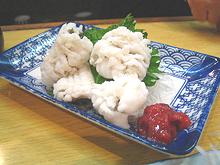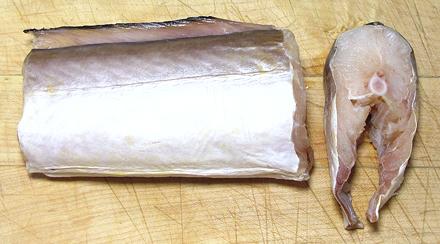 Buying: Probably you don't want to. In any case, you're
not going to find this fish fresh or live in North America, but segments
can occasionally be found in the frozen food cases of Asian markets here
in Los Angeles.
Buying: Probably you don't want to. In any case, you're
not going to find this fish fresh or live in North America, but segments
can occasionally be found in the frozen food cases of Asian markets here
in Los Angeles. [Hamo (Japan); Daggertooth Pike Conger, Summer Eel; Ca Lat Cat Khuc (Viet);
Muraenesox cinereus]
[Hamo (Japan); Daggertooth Pike Conger, Summer Eel; Ca Lat Cat Khuc (Viet);
Muraenesox cinereus]
While this Indo-West Pacific eel can grow to 7 feet, it is commonly about 3 feet long. Though it is very expensive to prepare and bland in taste, hamo is very popular around Kyoto, Japan. In ancient times it was one of very few fish tough enough to survive a multi-day journey to the inland capital. It is shot full of bones and cannot be de-boned, so Kyoto sushi chefs use special techniques. It is also used to make fish cakes and imitation crab, uses where the bones can be strained out. The photo specimens, from Vietnam, were about 2 inches thick by 2-1/2 inches high. This fish has no scales so is not kosher.
More on Eels.
 Buying: Probably you don't want to. In any case, you're
not going to find this fish fresh or live in North America, but segments
can occasionally be found in the frozen food cases of Asian markets here
in Los Angeles.
Buying: Probably you don't want to. In any case, you're
not going to find this fish fresh or live in North America, but segments
can occasionally be found in the frozen food cases of Asian markets here
in Los Angeles.
Cooking: This fish is always cooked, even served on
sushi rice. It is almost always seasoned because it is rather bland. In
Kyoto it is prepared many ways by sushi chefs, but always the price is
high. Note in the photo to the left, hamo is often puffy in appearance
due to the fine cutting in the preparation method (see below).
Photo by ayustety distributed under license Creative Commons
Attribution-Share Alike 2.0 Generic.